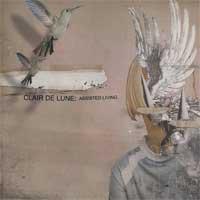In this new age of music we are entering, one wonders what Marshall McLuhan, who coined the phrase "the medium is the message," would think of the digital era, where hard copies have are slowly being eschewed for the ease of downloads. Assisted Living, the latest from Clair de Lune, had a limited pressing of 1,000 CDs available live or through Deep Elm's mail order, relying on major digital retailers for the rest of the sales (the digital version even including a bonus track). Some might argue that McLuhan would feel digital releases are a natural progression, that the attention span of today's youth may not be conducive to wandering around looking for physical copies or reading liner notes, and that the majority now only crave the actual songs. Others might argue that McLuhan is dead, and that this whole paragraph was irrelevant. They're probably right. So it goes.
Clair de Lune plays a style of emo-influenced post-hardcore that draws from acts such as At the Drive-In and No Knife, often gritty and dynamic yet also quite atmospheric and measured at times. While this usually works in the band's favor, there is the odd occasion that it does not. Something that has never sat well with me is a chorus that is significantly slower or less aggressive than its verses. It usually feels as if the verses are building up to something special and powerful, and then it's just 20 seconds of letdown (yes, I know -- that's what she said). The first track, "Killjoy," is a token example of this, and its title is extremely fitting. It opens with a fast-paced spitting of lines like "This party's giving more light. Pills popped in time for night life. Oh come on, watch and see addicted personalities split." The song sounds fantastic thus far and feels as if it should reach a fist-pumping chorus, but then loses steam and falls flat in its refrain. Not a great way to open an album. However, the second track avoids this, and by the third track the album has redeemed itself, as "Airplanes" features one of the most intense hooks to be found on the album in its shout-along chorus.
Aside from the unfortunate chorus in the opening track, the band really puts forth a noble effort. There are aggressive tracks that rip, but there are also slower tracks which bring delicate keyboards to the forefront to effectively convey the band's messages of consumerism, substance abuse, and deceit. The title track is a highlight, a moody, atmospheric piece with excellent use of violins to add to its depth, these instruments also appearing on the classically-inspired instrumental track "Winning Over Grief and Sorrow," a welcome addition to the latter half of the album.
Assisted Living has a few moments where it stumbles, and it is definitely an album that takes its time to grow on you, but once you become accustomed to Clair de Lune's sound you can begin to appreciate the intricacies within the album. A smart album that is unpredictable and covers a lot of ground through its 12 tracks, Assisted Living is another nice addition to the Deep Elm catalogue.
